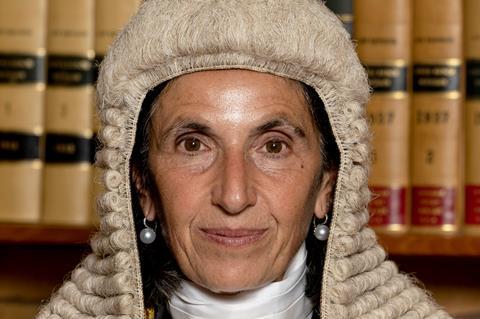Experts should ‘avoid giving the impression they know better than anyone else’, Lady Justice Simler told attendees at the Expert Witness Institute Conference today. The Court of Appeal judge told attendees there is no conflict in the duties an expert owes to the client and the overriding duty to the court.
She said: ‘The expert is relied on to give the court skilled and competent expert opinion evidence. The expert thus, owes duties to his client and, of course, has overriding duties to the court. There is no conflict in those two duties as explained in Jones v Kaney.’
In a pre-recorded speech to the online event she said: ‘The expert’s duty is to answer questions in a manner consistent with his overriding duty not to stick to his guns when the underlying basis for that opinion shifts.’
She advised experts dealing with large volumes of documents: ‘If faced with higgedly piggedly or piecemeal documentary evidence, ask for the documents to be ordered and paginated…make clear that the exercise will take longer to complete and will likely cost more if it is not done.
‘Identify the key issues before reading the documents so you know what you are looking for when you are reading…look out specifically for discrepancies. Read all the documents provided and if that means that you need to ask for more time, do so.’

Simler acknowledged that ‘lengthy’ reports were sometimes unavoidable but gave advice on how to set out the report and to ensure the report ‘demonstrates…that you have reflected on all the evidence and considered the weight of contrary evidence in coming to your view’.
‘Summarise the range of opinions if there is one, especially if your opinion is a minority one. An expert that makes reasonable concessions…but remains clear in his or her views [on the evidence] becomes more credible.
‘Experts should always answer the questions asked of them in court and avoid giving the impression they know better than anyone else.’
‘An expert should avoid cherry picking pieces of evidence which provide support for the conclusion he or she has reached while avoiding material that may point in the opposite direction. A contrary interpretation, analysis, or view should be set out in the report. Tempting as it might be, don’t leave the contrary interpretation to be raised by the expert instructed by the other part.’
She said an expert can then explain why the contrary view is not the better one and an expert who failed to discuss or consider contrary views ‘may be viewed by the court as losing objectivity and independence’ which could diminish credibility.


















![David Lester (senior partner at Blythe Liggins), Darryl Barnes, Jagdeep Sandher (head of dispute resolution at Blythe Liggins)[4]](https://d1d8vslyhr7rdg.cloudfront.net/Pictures/274x183/4/2/8/116428_davidlesterseniorpartneratblytheligginsdarrylbarnesjagdeepsandherheadofdisputeresolutionatblytheliggins4_981603_crop.jpg)





2 Readers' comments